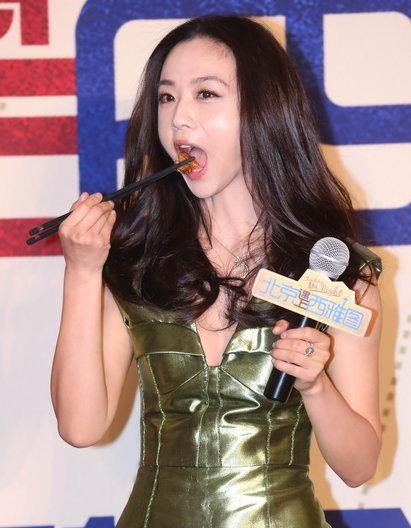当前位置: Language Tips> 新闻播报

By Raymond Zhou
My friend Zeng Jian recently posted an article railing against one component of the celebrity entourage, i.e. the publicity person and his or her fastidiousness with which reporters' questions are vetted.
Zeng is a veteran reporter that covers China's showbiz and he works for one of the biggest portal sites. That is to say, he probably gets more respect than the average workman on the beat. As he complained, reporters were rarely asked to submit a question list when he first started out in the business. Of course, a diligent person would prepare at least a page of questions in advance just for himself or herself. It could be scribbling only the writer could recognize.
However, a new practice has come into being: Reporters have to file the questions to the P.R. firm, who would forward it to the assistant to the star. And they would ask you to revise the questions, add something here or delete something there. Mostly deletions, though.
Zeng's griping got a lot of responses from his WeChat circle of friends. I chuckled, but did not add to the spool of incriminating tales.
The most famous story in recent memory of publicity screening that hurt more than helped its client is the one involving movie star Tang Wei. She divulged in an early interview that her favorite dish is pork braised in brown sauce. Her PR team deemed this innocuous detail unfit for her public image and forced the reporter to change it to mushroom and vegetables. The reporter spilled the beans and Tang was viewed as hypocritical. In later interviews, reporters were strictly forbidden from touching upon this topic. In the end, Tang came out to clarify that she indeed likes the pork dish.

Zeng said it was the P.R. guard who deprived Tang from a timely clarification on the issue.
In my experience, the celebrity client rarely reads the questions. It is the assistant or publicist who performs the mental acrobatic routine of shielding flying daggers. So they would prefer softball questions or questions couched in the idolizing language of fandom.
Most movie stars I've interviewed are very intelligent. Depending on their scheduling, which could be hectic on a campaign, they can be quick-witted and willing to communicate. It is the routine questions that would bore them (though they're good at not showing it). If you come up with unusual but relevant questions, they would light up. But those are often the questions that get nipped in the bud by the PR machine.
I don't have a problem with vetting, but it would be hard for me to stick to a script. If it's a natural dialogue, it would create its own flow and question ten may jump to question two as it happened with my conversation with British actor Colin Firth. Korean stars would not allow this, says Zeng, because the translator would not budge if you deviate from the prepared list.
Sure, reporters ask stupid questions, too. It is the job of their editors and readers to weed them out.
If you treat celebrity interviewees as fragile porcelain, they will lose their tenacity as normal human beings and become brittle.
(编辑:董静)
Broadcaster

Raymond Zhou is a columnist for China Daily. A bilingual writer specializing in movies, theater and other cultural or social topics, he has published 20 Chinese and English books in addition to numerous articles. Other than critical and journalistic writing, he writes and directs stage plays and films. He has an MBA from the University of California at Berkeley and two other degrees from China.
上一篇 : Forgiving a thief in the night
下一篇 :
关注和订阅

电话:8610-84883645
传真:8610-84883500
Email: languagetips@chinadaily.com.cn